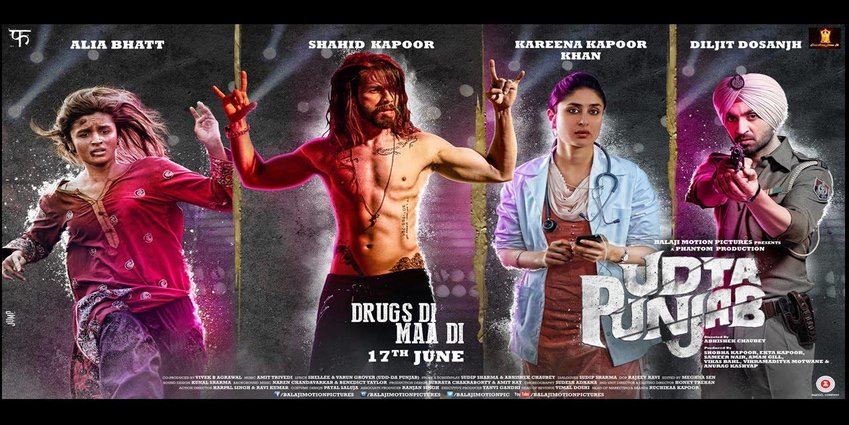
The Reel Controversy
Phantom Productions and Balaji Motion Pictures’ film ‘Udta Punjab,’ directed by Abhishek Chaubey, has been through the wringer in the past few weeks due to disagreements with the Central Board of Film Certification (CBFC) chief Pahlaj Nihalani.
What Happened?
On June 6, the makers of the film were asked to make 89 cuts to the film by the CBFC, including removing the word ‘Punjab’ from the film entirely, stating that the film was attempting to portray Punjab and the Sikh community in a bad light.
In return, the actors, director, and producers involved with the film have said that drug addiction is a country-wide problem, but every story needs a backdrop, and for “Udta Punjab,” Punjab was the chosen backdrop. They have also pointed out statistics that support the fact that drug addiction remains a large issue in Punjab.
Nihalani also accused Phantom Productions’ producer Anurag Kashyap of accepting money from the Aam Admi Party to make “Udta Punjab” and of being affiliated with certain political parties. Kashyap denied the allegations stating that when political parties tried to get involved in his battle for the film’s release, he told them to stay out of it.
The board also asked for the removal of profanity, in addition to words relating to the government, such as “elections” and “parliament.”
The makers of the film had not received the formal letter with the list of cuts that they were verbally asked to make.
A public Indian Film and Television Directors Association meeting was held on June 8, where well-known filmmakers from the Hindi film industry, including Zoya Akhtar, Imtiaz Ali, Mukesh Bhatt, and Mahesh Bhatt, spoke in support of the film and the freedoms that filmmakers should be able to have in a democracy which allows for freedom of speech.
That same day the filmmakers of “Udta Punjab” moved to the Bombay High Court to legally settle the matter, as they were unable to go to the Tribunal because they did not have the official letter from the CBFC stating the specific cuts that needed to be made.
On June 13, the Bombay High Court ruled in favor of the film, ordering for only one cut—the shot of Shahid Kapoor’s character urinating in front of a crowd—and a change to the disclaimer that would be placed at the beginning of the film. The court reminded the CBFC that their job is to certify films, not to censor them. The court then ordered the CBFC to certify the film with an ‘A’ rating for release within two days of the decision.
And justice there is!!!!!!!!! #BombayHighCourt ….#UdtaPunjab …as a filmmaker I feel empowered and relieved!!!!
— Karan Johar (@karanjohar) June 13, 2016
Am an eternal optimist…and I know that #UdtaPunjab has paved the way for cinema liberation….a filmmaker is reborn today in india…
— Karan Johar (@karanjohar) June 13, 2016
#UdtaPunjab gives hope to honest film makers. Creative freedom will give us good cinema and stop the world from laughing at our films
— Arshad Warsi (@ArshadWarsi) June 16, 2016
The triumph of #UdtaPunjab is the victory of #Democracy. And a victory for the spirit that DOES NOT GIVE IN OR GIVE UP.
— Dia Mirza (@deespeak) June 13, 2016
Every filmmaker & film lover will be grateful for the historic #HC verdict! Let creativity live. Let audiences decide. Let #UdtaPunjab fly!
— SOPHIE CHOUDRY (@Sophie_Choudry) June 13, 2016
And FINALLY #UdtaPunjab will flyyyyy!!Here’s to freedom of expression, to our judiciary, to the industry, to the media and to YOU ALL!! ????
— Alia Bhatt (@aliaa08) June 13, 2016
In celebration of the court’s verdict, and to thank the press and the rest of the film fraternity for their contribution, a press conference was held on June 14 by the makers of the controversial film.
The film was also cleared by the Punjab and Haryana high court after a preview screening was ordered due to two petitions they received against the film.
What This Means for the Hindi Film Industry Going Forward?
The outcome of this legal case has been celebrated by the Hindi film industry as a win for creative freedom for filmmakers, hoping that this will set a precedent for future films as well. Kashyap has said in interviews that he hopes the battle for the release of “Udta Punjab” and its eventual win will prevent this type of issue from happening to other films tackling dark, gritty, or commercially-risky topics in the future.
This hopefully will allow writers, directors, and actors to experiment with novel concepts and story ideas, creating unique films where content is key. Knowing these films will likely not be shelved or banned by the courts, producers may be more inclined to financially back such films.
Another result of this court case that has been discussed at the numerous press conferences held for “Udta Punjab” is the unity that the Hindi film industry developed during this trying time for the filmmakers. This instance is a primary example of the change the industry can bring if they come together as one voice.
New Problems Arise…
With the legal battle over, the film ran into yet another problem. Early Wednesday morning, a version of the film was leaked online. Some links to the pirated copy of the film were reported to have crashed computer systems. Many of the links have been reportedly pulled offline. There have been allegations against the CBFC of leaking the film because the version of the film released was uncut and contained a “censor” watermark.
The CBFC has since denied these allegations. The producers of the film have filed a complaint with the Cyber Crime Cell in Mumbai. The investigation is ongoing.
The industry has come together again on social media to ask audiences to avoid watching the pirated copy of the film. Kashyap took to Facebook asking people to hold off on downloading the film. He states that he has no issue with piracy, but would hope that the audiences would hold off downloading the film until Saturday, to not detract from the film’s Friday release.
The Reality
by Ravleen Kaur – Follow @rippinrav 
Last December, I went to Punjab to attend my cousins’ weddings. During the few weeks I spent there, I heard the stories. The story of a man in the village becoming a drug addict. The whispers behind closed doors about young men smoking heroin, or chitta, in the lush fields of Punjab and running maniacally behind cars passing through on the dirt road. The news that a car had been attacked by the same men in their drug-induced craze at night. The warnings to not take certain paths in and out of towns and villages because it was known that a group of smack addicts was hanging around in those areas at night.
There are all these stories and warnings, but not a single ounce of large-scale, organized action against the epidemic. But, of course, what can normal Punjabi families do when they are too busy raising their own families and providing them with enough to eat?
I have been to Punjab. The media can tout as much as they want that Punjab is a “rich” state, but I know it is lacking health-related resources. CNBC-TV 18 recently released a video stating important facts about the drug crisis:
“There are Punjabi villages with no men left in them because they either died or deserted their families due to drugs; Over 75 percent of Punjabi youth is addicted to drugs; There is almost one addict per family in rural areas.”
BBC News echo these statistics, citing a “village of widows” near Amritsar full of women who have lost their husbands and sons to drugs. Additionally, the Times of India reported in 2009 that 51.6 percent of Punjabi youth was addicted to drugs, a rate 18 times higher than the national average.
At the end of the video, CNBC-TV18 tells Punjab:
“Today, we look up to you again. Defeat drugs. Please.”
https://www.facebook.com/cnbctv18india/videos/1059051624132235/
Although I shared and liked the video, one thing irked me. They say all this as if it is in the hands of the common Punjabi citizen to control the indirectly complicit policemen and organized drug traffickers. As if Punjabis aren’t already educating and trying to steer their children away from drugs. As if American-based organizations, such as Sikh Kid to Kid, aren’t already fundraising and planning camps for underprivileged children in Punjab to help stop the crisis from manifesting in the younger generation.
Begging Punjab to “defeat drugs” just because you have always looked up to Punjabis for inspiration, defense, and food is selfish and misdirected. You should be pleading with the Indian government to allow films like “Udta Punjab” to be released for the world to view in their raw entirety. You should be urging the state and central governments to spend more time and money on creating drug rehabilitation centers and increasing border security.
Defeating such a large drug crisis in a state that is the main point of entry for drugs from Afghanistan and Pakistan requires the patience and cooperation of citizens and all levels of government. Now that “Udta Punjab” is finally going to be released, progress can finally be made.
“Udta Punjab” is set to officially release Friday, June 17.
 Gabrielle Deonath is a full-time college student. She is a contributor to the teen column, “At The Crossroads,” in SISTERS Magazine and the author of the “Hijab Diaries” series on virtualmosque.com. Her dream is to be a journalist and novelist one day. One of her biggest obsessions is Bollywood movies and music. When she’s not in class or following her dream of becoming a writer, she most likely is choreographing a dance to the latest song or watching a new Bollywood movie. To read more, visit her blog at hijabdiaries.com.
Gabrielle Deonath is a full-time college student. She is a contributor to the teen column, “At The Crossroads,” in SISTERS Magazine and the author of the “Hijab Diaries” series on virtualmosque.com. Her dream is to be a journalist and novelist one day. One of her biggest obsessions is Bollywood movies and music. When she’s not in class or following her dream of becoming a writer, she most likely is choreographing a dance to the latest song or watching a new Bollywood movie. To read more, visit her blog at hijabdiaries.com.
 Ravleen Kaur is a student at The Ohio State University studying public affairs and public health. Her hobbies include drinking over-sweetened coffee and performing bhangra in public spaces. She is currently planning to run away from her home state in the Deep South and eventually work in the public health field.
Ravleen Kaur is a student at The Ohio State University studying public affairs and public health. Her hobbies include drinking over-sweetened coffee and performing bhangra in public spaces. She is currently planning to run away from her home state in the Deep South and eventually work in the public health field.




